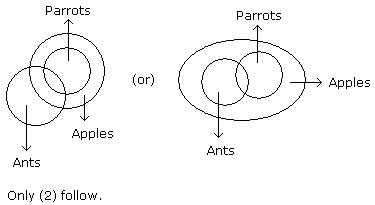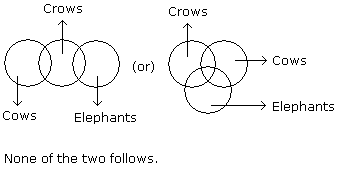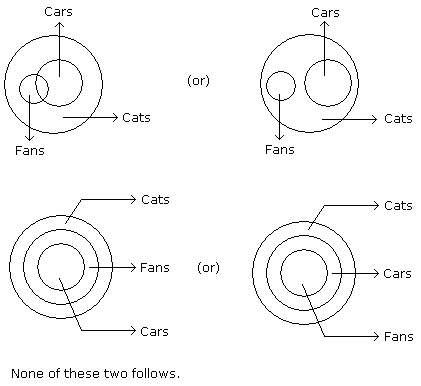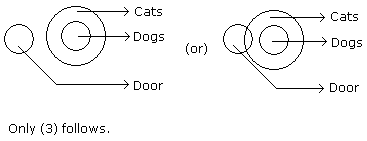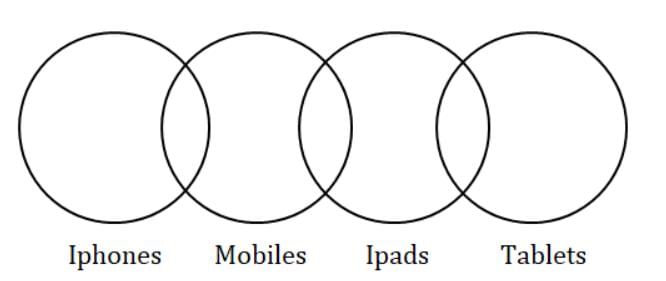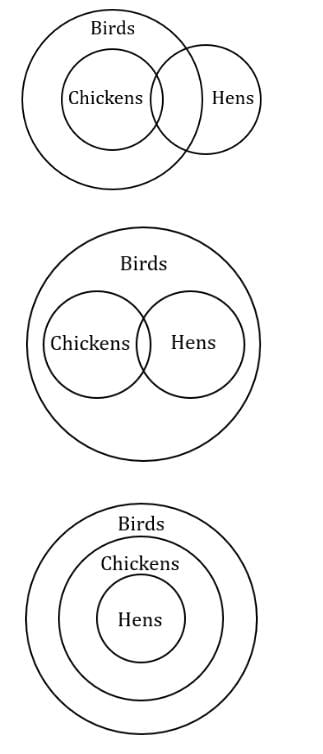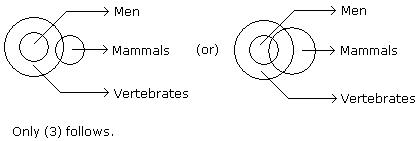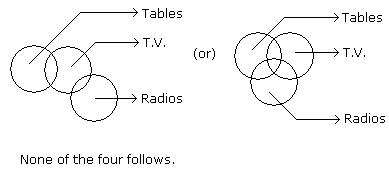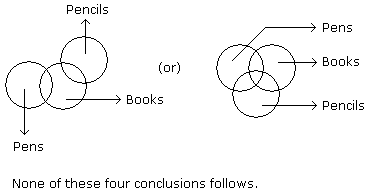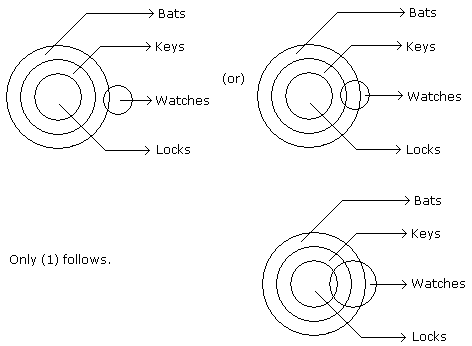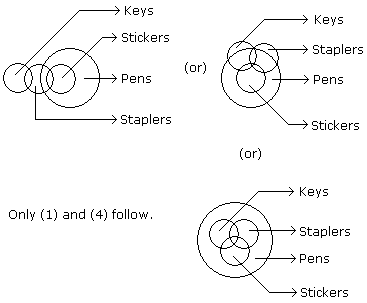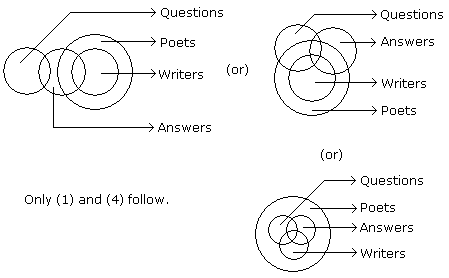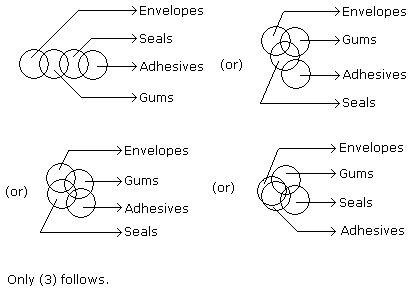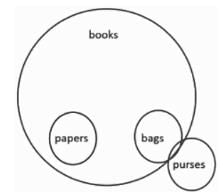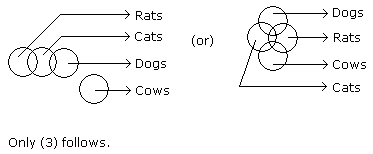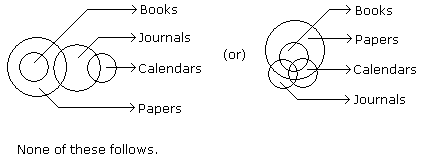Test: Syllogism - 3 - Bank Exams MCQ
20 Questions MCQ Test - Test: Syllogism - 3
Directions to Solve
In each of the following questions two statements are given and these statements are followed by two conclusions numbered (1) and (2). You have to take the given two statements to be true even if they seem to be at variance from commonly known facts. Read the conclusions and then decide which of the given conclusions logically follows from the two given statements, disregarding commonly known facts.
Give answer:
- (A) If only (1) conclusion follows
- (B) If only (2) conclusion follows
- (C) If either (1) or (2) follows
- (D) If neither (1) nor (2) follows and
- (E) If both (1) and (2) follow.
Question -
Statements: Some ants are parrots. All the parrots are apples.
Conclusions:
- All the apples are parrots.
- Some ants are apples.
Directions to Solve
In each of the following questions two statements are given and these statements are followed by two conclusions numbered (1) and (2). You have to take the given two statements to be true even if they seem to be at variance from commonly known facts. Read the conclusions and then decide which of the given conclusions logically follows from the two given statements, disregarding commonly known facts.
Give answer:
- (A) If only (1) conclusion follows
- (B) If only (2) conclusion follows
- (C) If either (1) or (2) follows
- (D) If neither (1) nor (2) follows and
- (E) If both (1) and (2) follow.
Question -
Statements: Some cows are crows. Some crows are elephants.
Conclusions:
- Some cows are elephants.
- All crows are elephants.
Directions to Solve
In each of the following questions two statements are given and these statements are followed by two conclusions numbered (1) and (2). You have to take the given two statements to be true even if they seem to be at variance from commonly known facts. Read the conclusions and then decide which of the given conclusions logically follows from the two given statements, disregarding commonly known facts.
Give answer:
- (A) If only (1) conclusion follows
- (B) If only (2) conclusion follows
- (C) If either (1) or (2) follows
- (D) If neither (1) nor (2) follows and
- (E) If both (1) and (2) follow.
Question -
Statements: All cars are cats. All fans are cats.
Conclusions:
- All cars are fans.
- Some fans are cars.
Directions to Solve
In each of the following questions two statements are given. Which are followed by four conclusions (1), (2), (3) and (4). Choose the conclusions which logically follow from the given statements.
Question -
Statements:
- No door is dog.
- All the dogs are cats.
Conclusions:
- No door is cat.
- No cat is door.
- Some cats are dogs.
- All the cats are dogs.
From the given statements, choose the conclusions which follow logically:
Statements:
i. Some iphones are mobiles
ii. Some mobiles are ipads
iii. Some ipads are tablets
Conclusions:
I. Some tablets are iphones
II. Some mobiles are tablets
III.Some ipads are iphones
IV.All iphones are tablets
Statement 1: All chickens are birds.
Statement 2: Some chickens are hens.
Statement 3: Female birds lay eggs.
If the above statement are facts, then which of the following must also be a fact?
I. All birds lay eggs.
II. Hens are birds.
III. Some chickens are not hens.
Directions to Solve
In each of the following questions two statements are given. Which are followed by four conclusions (1), (2), (3) and (4). Choose the conclusions which logically follow from the given statements.
Question -
Statements: All men are vertebrates. Some mammals are vertebrates.
Conclusions:
- All men are mammals.
- All mammals are men.
- Some vertebrates are mammals.
- All vertebrates are men.
Each of the questions below starts with a few statements, followed by four conclusions numbered 1, 2, 3 and 4. You have to consider every given statement as true, even if it does not conform to the accepted facts. Read the conclusions carefully and then decide which of the conclusion(s) logically follow(s) from the given statements, disregarding commonly known facts.
Statements:
a. All teachers are professors
b. All professors are researchers
c. All researchers are consultants
Conclusions:
1. Some consultants are teachers
2. All professors are consultants
3. Some researchers are teachers
4. All professors are teachers
Each of the questions below starts with a few statements, followed by four conclusions numbered 1, 2, 3 and 4. You have to consider every given statement as true, even if it does not conform to the accepted facts. Read the conclusions carefully and then decide which of the conclusion(s) logically follow(s) from the given statements, disregarding commonly known facts.
Statements:
a. Some boys are scholars
b. Some teachers are boys
c. All scholars are observers
Conclusions:
1. Some scholars are boys
2. Some scholars are not boys
3. Some observers are boys
4. Some teachers are scholars
Directions to Solve
In each of the following questions two statements are given. Which are followed by four conclusions (1), (2), (3) and (4). Choose the conclusions which logically follow from the given statements.
Question -
Statements:
- Some tables are T.V.
- Some T.V. are radios.
Conclusions:
- Some tables are radios.
- Some radios are tables.
- All the radios are T.V.
- All the T.V. are tables.
Statement 1: Pictures can tell a story.
Statement 2: All storybooks have pictures.
Statement 3: Some storybooks have words.
If the above statement are facts, then which of the following must also be a fact?
I. Pictures can tell a story better than words can.
II. The stories in storybook are very simple
III. Some storybooks have both words and pictures.
Directions to Solve
In each of the following questions two statements are given. Which are followed by four conclusions (1), (2), (3) and (4). Choose the conclusions which logically follow from the given statements.
Question -
Statements:
- Some pens are books.
- Some books are pencils.
Conclusions:
- Some pens are pencils.
- Some pencils are pens.
- All pencils are pens.
- All books are pens.
The statement below is followed by three outcomes numbered I, II and II. An outcome is either a step of administrative decision to be undertaken for improvement, or a follow-up for further action, or natural response by stakeholders, etc. on the basis of the information provided in the statement. Everything mentioned in the statement is to be assumed to be true, on the basis of which the most logically followed course of action has to be decided.
Statement:
The city council of Brownwood City has decided to install a plant of mineral water to provide the citizens mineral water bottles at US $ 1 per bottle as against bottles costing US $ 1.5 being sold by local private players.
I. All the local private companies selling bottled water in Brownwood City will have to close their operations.
II. The city council of Brownwood City will have to provide for the losses from this project in its budget.
III. The normal tap water supply of Brownwood City will have no takers and that will have to be discontinued.
Directions to Solve
In each of the following questions there are three statements. Which are followed by three or four conclusions. Choose the conclusions which logically follow from the given statements.
Question -
Statements:
- All the locks are keys.
- All the keys are bats.
- Some watches are bats.
Conclusions:
- Some bats are locks.
- Some watches are keys.
- All the keys are locks.
Directions to Solve
In each of the following questions there are three statements. Which are followed by three or four conclusions. Choose the conclusions which logically follow from the given statements.
Question -
Statements:
- Some keys are staplers.
- Some staplers are stickers.
- All the stickers are pens.
Conclusions:
- Some pens are staplers.
- Some stickers are keys.
- No sticker is key.
- Some staplers are keys.
Directions to Solve
In each of the following questions there are three statements. Which are followed by three or four conclusions. Choose the conclusions which logically follow from the given statements.
Question -
Statements:
- Some questions are answers.
- Some answers are writers.
- All the writers are poets.
Conclusions:
- Some writers are answers.
- Some poets are questions.
- All the questions are poets.
- Some poets are answers.
Directions to Solve
In each of the following questions there are three statements. Which are followed by three or four conclusions. Choose the conclusions which logically follow from the given statements.
Question -
Statements:
- Some envelops are gums.
- Some gums are seals.
- Some seals are adhesives.
Conclusions:
- Some envelopes are seals.
- Some gums are adhesives.
- Some adhesives are seals.
- Some adhesives are gums.
Directions to Solve
In each of the following questions there are three statements. Which are followed by three or four conclusions. Choose the conclusions which logically follow from the given statements.
Question -
Statements:
- All the papers are books.
- All the bags are books.
- Some purses are bags.
Conclusions:
- Some papers are bags.
- Some books are papers.
- Some books are purses.
Directions to Solve
In each of the following questions there are three statements. Which are followed by three or four conclusions. Choose the conclusions which logically follow from the given statements.
Question -
Statements:
- Some rats are cats.
- Some cats are dogs.
- No dog is cow.
Conclusions:
- No cow is cat.
- No dog is rat.
- Some cats are rats.
Directions to Solve
In each of the following questions there are three statements. Which are followed by three or four conclusions. Choose the conclusions which logically follow from the given statements.
Question -
Statements:
- All the books are papers.
- Some papers are journals.
- Some journals are calendars.
Conclusions:
- Some journals are books.
- Some calendars are papers.
- Some books are journals.
- Some books are calendars.


